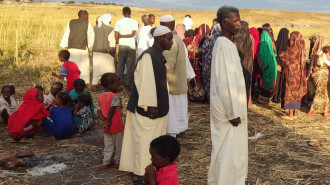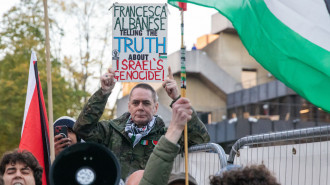Qissat: Short Stories by Palestinian Women
Women from marginalised groups have had to fight multiple oppressive battles within and outside their communities.
We've seen it in African women during the fight for independence, in African-American women during the Civil Rights Movement, and in Black South African women in the struggle against apartheid. Palestinian women are no different. Qissat: Short Stories by Palestinian Women is a collection that celebrates this tradition of fighting multiple battles.
Edited by Jo Glanville, this collection of 16 stories from different writers across different generations represents the diasporic and diverse nature of the Palestinian women experience. It is especially pertinent since time and place inherently feed the battles of oppression that Palestinian women face.
"[The contributors] compassionate and unsuspectingly critical views on societal issues will force readers to re-examine normalised but oppressive structures"
To expound, the experiences of women living under Israeli occupation now is, to some extent, different from the experiences of women after the intifadas. Similarly, the experiences of Palestinian women in refugee camps in Lebanon are different from that of Palestinian women with citizenship in countries like the UK.
As Glanville notes in her insightful introduction, the contributors were under no obligation to write a specific theme, but the loss of innocence reverberated across most of the entries. Many of the main characters in the stories are children or adolescents, making this loss of innocence more glaring. Still, their compassionate and unsuspectingly critical views on societal issues will force readers to re-examine normalised but oppressive structures.
For instance, in the opening story, Barefoot Bridge, Randa Jarrar's character asks her father why they have to travel from Egypt to Jordan to visit her grandma, when 'on the map, Palestine is a country stuck to Egypt'. Likewise, in Nathalie Handal's Umm Kulthoum at Midnight, the teenage raconteur points out how hypocritical it is that men in her household tell women 'to be pure, stay virgins' while 'they are looking at porn'.
Through their innocence, these characters criticise two primary oppressions that Palestinian women experience, although the realisation that will inevitably come after their criticism threatens that innocence.
|
Another significant violence that many women in some Muslim societies face, honour killing, is explored by some entries. Maryam, a beautiful, illiterate woman, runs off with her lover in The Letter by Laila al-Atrash.
When the neighbourhood begins to prod Maryam's menfolk to 'kill her and wash their honour clean', our young main character Saad, who admires Maryam, suffers horrifying nightmares at the prospects of her murder. Also, in Her Tale, Samira Azzam's main character is a prostitute who pleads with her brother not to kill her. A vengeful man who our character rejects had inflamed her brother in the name of honour.
These stories highlight that the fight for social liberation links with the struggle for national freedom for many Palestinian women.
"This collection is also a great way to discover both older and newer Palestinian authors whose writings preserve these overlooked themes"
No Palestinian writing is complete without a mention of checkpoints, and some of the stories expose how sinister these checkpoints can be. For example, in Randa Jarrar's Barefoot Bridge, the young character notes how all women are stripped, even of their shoes, even when ‘grenades are too big to be hidden in shoes’.
Likewise, in Liana Badr's Other Cities, a woman displays immense courage when she decides to visit Ramallah with her children. She does not have Israeli-issued identification, so travelling from her home in Hebron to Ramallah puts her at risk of deportation. Through her musings, Badr compels readers to examine their possible privilege to travel quickly for pleasure within their countries, in contrast to Palestinians who require 'urgent matters' to travel between towns – since the arduous process at checkpoints discourages any thoughts of 'travelling for pleasure'.
Additionally, some entries explore death within the Palestinian society to pinpoint how martyrdom is often attached to the dead. In Dates and Bitter Coffee, Donia ElAmal Ismaeel details how a family grieve when their son dies. Although they mourn the boy's loss as they know him – their son – his new title of shaheed transforms the mourning ceremony. The story and its title bring to life the Palestinian ritual of mourning as dates and Palestinians commonly serve bitter coffee during mourning.
Not all the stories reference the occupation of Palestine. For example, in Nibal Tahwabeth's My Shoe Size and Other People's Views on the Matter! the narrator discovers that she has worn the wrong shoe size all her life in an attempt to fit the misguided notion that shoe size directly relates to femininity. It is important to note that some stories exclude the occupation because Glanville mentions that some contributors dislike that their works are limited to the Palestinian struggle.
This dislike is substantiated since the international literary interest at the time of publication favoured memoirs while the more extensive Palestinian cultural and everyday experiences received little focus. Thus, this collection is also a great way to discover both older and newer Palestinian authors whose writings preserve these overlooked themes.
With more contributions from noteworthy writers likes Adania Shibli, Selma Dabbagh, Naomi Shihab Nye, and Huzama Habayeb, Qissat: Short Stories by Palestinian Women is indeed a poignant collection that highlights the brilliance of Palestinian writing.
Aisha Yusuff is a book reviewer with a focus on African and Muslim literature. Her work can be found on @thatothernigeriangirl as well as in digital magazines like Rewrite London.
Follow her on Twitter: @allthingsaeesha
!["Qissat: Short Stories for Palestinian Women" is a rare showcase of Palestinian women writers across generations [Saqi Books]](/sites/default/files/styles/image_345x195/public/2021-06/Qissat_0.jpg?h=d1cb525d&itok=k1itcHCX)




 Follow the Middle East's top stories in English at The New Arab on Google News
Follow the Middle East's top stories in English at The New Arab on Google News


